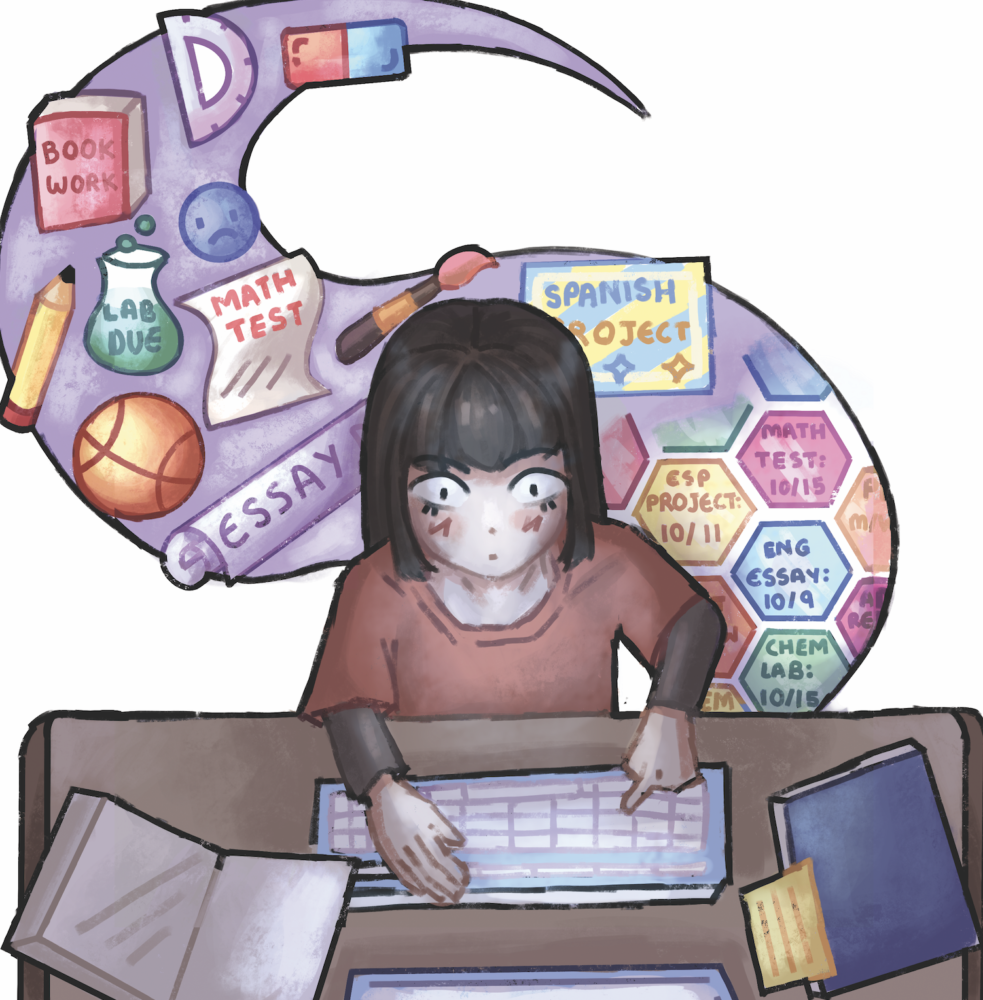productivity or procrastination: students use apps to help focus and plan
A laundry list of items — ranging from a collection of finished books to an exam calendar — neatly populates on Palo Alto High School senior Evie Barclay’s computer screen.
Barclay is among the 56.9% of Paly students that have incorporated productivity apps into their daily lives and schedules, according to an opt-in survey by Verde Magazine of 132 Palo Alto High School students.
One such app is Forest, a popular productivity tool designed to help users focus for a fee of $1.99 by allowing them to plant digital trees that are killed upon exiting the app. According to its website, Forest also partners with Trees for the Future which plants real trees in sub-Saharan Africa. Users can help plant real trees with “coins” that are generated from successfully growing digital trees in the app.
Senior Jia Hiremath said that the app helps her stay off of her phone while studying in fear of “killing” the digital tree. Forest also allows the users to add friends and grow a group tree together when they all are in the same study session.
“Now I have five people on Forest,” Hiremath said. “I can [grow] group trees with them if we are studying together to get more trees and points and don’t want to look at our phones.”
While Forest’s main goal is to help with focus, Notion is an application that can help students with organization. The free, highly personalizable workspace application has garnered over 30 million users since its release in June 2018. With many templates ranging from product planning to note-taking, according to their website, Notion is where “your daily work and knowledge live side by side — so you never lose context.”
People online create and share specialized Notion templates for others to use but Hiremath, however, said she doesn’t take part in them.
“I know that there’s definitely a specific type of community online that uses apps like these and are focused on prioritizing studying and doing things like bullet journaling, planning,” Hiremath said. “They use apps like Notion and Forest to stay focused, but I don’t think that I have really been a part of communities like that. I mostly have used the app with my friends and to keep myself on track.”
Students like junior Kylie Yen find themselves drawn to this app because of these benefits.
“I use it [Notion] so that I can stay on top of my homework,” Yen said. “I try to use it to remember my assignments because I usually forget.”
Although many Notion templates are available online — such as ones with book logs, themes and complicated mood trackers — Yen feels that sometimes a basic layout maximizes the functionality and keeps her focused.
“Mine’s pretty simple,” Yen said. “I just have my to-do list with all my assignments and then I delete them when I’m done with them.”
Although some students use Notion simply for a to-do list, it is also capable of being used creatively with options to create timelines, embedded links and shared workspaces. This, however, must be a restrained effort to stop the application from becoming a procrastination tactic itself.
“I think there’s a balance,” Barclay said. “Notion is a tool, it can be a distraction, it can be a creative outlet and it can serve as many things. If I’m using it for schoolwork, I try to use it as strictly as a tool as possible.”
Along with Notion, Barclay uses Google Calendar to plan out her schedule by blocking off time to complete tasks and planning out events.
“I use Google Calendar to block time visually,” Barclay said. “When I think about the day I have ahead, I think about the boxes of time that I’ve allotted for any specific task or event, like an afternoon dentist appointment or Saturday night study block.”
Even though there are many different calendar applications available, Barclay, and many other students, chooses Google Calendar over them because of its user-friendliness.
“I find Google Calendar to be the simplest, most universal and most user-friendly application,” Barclay said. “It’s easy to access on any device and I can even make different calendars for different Gmail addresses if I need to.”
Although it’s possible to schedule one’s life down to the minute using Google Calendar, Barclay feels that this is unnecessary for a productive life. Barclay finds that planning out every moment of her life takes away from living in the moment so she likes to leave in an air of spontaneity in her life.
“Google Calendar can be helpful to remember to sit down and commit to that scheduled event,” Barclay said. “However, I don’t follow my calendar to a ‘T.’ Life happens and schedules can fail to account for other things that need to get done. At the end of the day I think there can be a balance between productivity and being present.”



